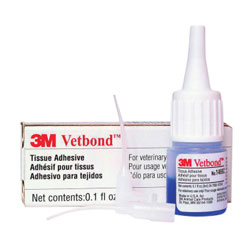Vetbond Tissue Adhesive
+ Save on each recurring order!
- Strong bond
- Polymerizes in seconds
- Minimizes tissue trauma
- Reduces need for analgesia
- Protects wound while healing
- Acts as a barrier to keep foreign matter from entering wound
Description
Vetbond can be used in a variety of procedures, including cat declaws, dewclaw removal, lacerations, tooth extractions, oral surgery and other minor wound closures. It quickly and conveniently closes minor wounds, often eliminating the need for sutures and/or bandages.
- N-butyl cyanoacrylate
- Clear bottle for better inventory maintenance
- Contains blue dye for easy-to-see drop application
by 3M
3M™ VETBOND™ TISSUE ADHESIVE
3M
Description:
3M™ Vetbond™ Tissue Adhesive is an n-butyl cyanoacrylate adhesive used to bond tissue together for veterinary procedures (i.e. cat declaws, lacerations, abrasions, suture/staple line sealing, tooth extractions, oral surgeries, and dewclaw removal). Product contains blue dye to allow user to easily see where product has been applied. On contact with body tissue, Vetbond adhesive changes from liquid to solid state by polymerizing within seconds to seal a wound. Adhesive stops minor bleeding and binds wound edges. May eliminate need for sutures/bandages in some instances. Also acts as a barrier to keep foreign matter from entering the wound. Tissue adhesive is sloughed as healing occurs. Each 3 ml bottle contains approximately 150 drops.
Precautions:
1. Avoid contact with skin and eyes. For use near eyes, place damp towel over eyes for protection. If on skin, wipe immediately with a paper towel. May be removed from skin with dimethylsulfoxide (DMSO). If in eyes, hold eyelids open and flush thoroughly with water. An opththalmologist should be consulted.
2. Use in well-ventilated are. Avoid breathing vapors over long periods of time.
3. Avoid contact of adhesive with instruments, gloves and surgical instruments. Polymerized adhesive on instruments can be removed by soaking in acetone.
4. DO NOT USE if adhesive appears thicker than water at room temperature. Thickened product has partially polymerized and will not form an acceptable bond.
5. DO NOT USE internally, on infected and/or deep puncture wounds, or below the epidermal layer.
6. DO NOT USE in the presence of soaps, cotton products (gauze, cotton tipped applicators, etc.), basic substances (soaps, etc.) or polyurethane foam applicators. These materials may cause excessive exothermic (heat generating) reaction.
Storage:
Product can be refrigerated or frozen to extend shelf life before opening.
Store bottle upright on shelf in a cool, dry place (away from heat). After opening, DO NOT RETURN BOTTLE TO REFRIGERATOR.
Note: A white chalky material may form on the outside of the bottle (bottle blooming). This is normal and does not compromise the effectiveness or the integrity of Vetbond tissue adhesive.
Instructions:
1. Vetbond tissue adhesive must be at room temperature before use. Do not heat.
2. Remove bottle cap. To open, cut off bottle tip with scissors or blade. Place flexible applicator tip on bottle.
3. Vetbond adhesive may be used between stainless steel staples, but application of adhesive on staples may interfere with staple removal.
4. When finished, remove excess adhesive in vial tip by holding bottle upright and gently squeeze single drop of adhesive out of tip onto a paper towel. Wipe bottle tip with the same paper towel. Replace bottle cap. Expel adhesive from applicator tip by pushing air through it from a standard syringe.
Wound/Surgical Application:
1. Clip hair from site.
2. Wash with anti-bacterial soap, rinse and dry.
3. Apply preoperative prep (3M™ DuraPrep™ Surgical Solution, povidone-iodine preparations, chlorhexidine or isopropyl alcohol).
4. Allow the prep solution to completely dry prior to surgery.
5. After the surgical procedure is complete, approximate the edges of the wound/surgical incision.
6. Application site should be free of excess fluids for best adhesion and to avoid an excessive exothermic (heat generating) reaction.
7. Apply Vetbound adhesive sparingly to the surface of the site to form a thin layer. Thick applications will crack and lift prematurely.
8. Avoid touching moist surfaces with applicator tip.
9. Do not apply Vetbound tissue adhesive internally or below the epidermal layer.
Declaw application:
1. Prepare surgical site as usual and amputate claws using routine surgical procedure.
2. Remove as much blood as possible from incision site by blotting.
3. Approximate the edges of the wound/surgical site and sparingly apply Vetbond tissue adhesive to cut surfaces of the skin using the plastic applicator tip provided. One drop for each digit should be sufficient. Caution: Do not allow Vetbond tissue adhesive to drip into the cavity. Any residual tissue adhesive below the closure site can cause foreign body reactions. Do not glue hair into site.
4. Hold skin edges for 5-10 seconds.
5. After completing the procedure, check for bleeding and reapply a drop of adhesive to the skin edges if necessary. Bleeding will normally stop within 5-10 minutes. Sutures or dressings are usually not needed, but a pressure bandage may be applied if warranted.
DuraPrep and Vetbond are trademarks of 3M
3M Animal Care Products, St. Paul, MN 55144-1000
Customer Service: 1-800-848-0829







